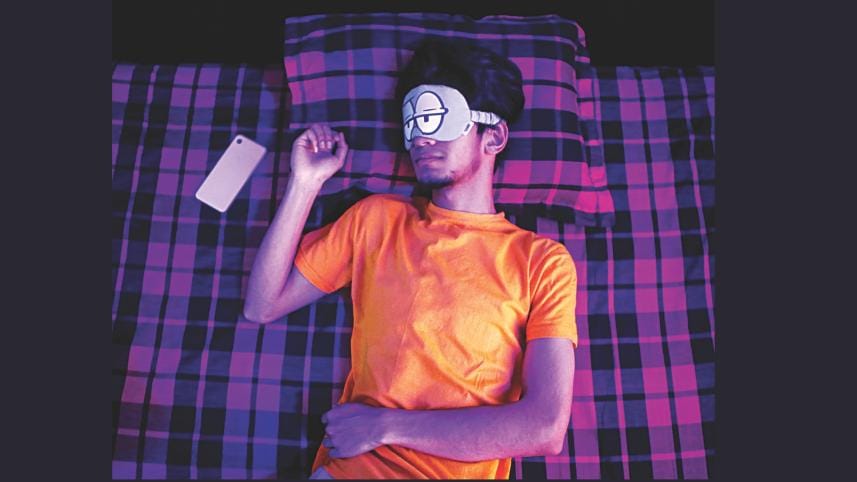How do you sleep?

It's 2 AM and you mindlessly go through social media, contemplating your day. Suddenly, you realise you forgot to set the alarm and as you do, your phone tells you that you only have four hours and 23 minutes to sleep. Hurriedly, you put your phone aside; if only you could do that to your mind too.
Nowadays, many people struggle to fall asleep. Once they do, though, they struggle to have enough of it.
"I usually feel terrible after waking up. I roughly get about four to five hours of sleep when I have classes. I go to sleep around 3 or 4 AM and have to wake up around 7. Hence, I feel like I have no energy and I often miss classes," says Farhan Kabir, 21, student of University of Dhaka. While the average circadian rhythm may vary from person to person, most people nowadays do not seem to be getting good sleep.
So what is good sleep? According to sleepfoundation.org, sleep without any interruption for seven to nine hours in a 24-hour period and falling asleep within around 15 to 20 minutes of lying down is "good sleep". It also includes the ability to sleep well, meaning that they must wake up feeling refreshed and alert, and capable of being fully productive.
To explore the current situation and sleeping patterns of young individuals, SHOUT conducted an online survey last week. The survey had over 250 respondents and in the process, we received some valuable insights into the topic.
THE SURVEY
The participants of the survey—their age ranging from 14 to 33—were mostly university and school students with about 57 and 25 percent respectively. Of them, just over half said that they go to sleep between 12 AM and 2 AM, while just over a quarter responded they go to sleep between 2 AM and 4 AM. Hence, not only are majority of people going to sleep extremely late, but they are also waking up really early. According to our survey, over 30 percent of the participants wake up between 6 AM and 8 AM and almost 50 percent wake up between 8 AM and 10 AM.
If this wasn't bad enough, upon further analysis, we found out that about 30 percent of people who go to sleep between 2 and 4 in the morning also have to wake up between 6 AM and 8 AM, giving them only about six hours of sleep on an average. We further went on to find out the percentage of people who sleep after 2 and have work or school before 9—the number was a staggering 64 percent. What this says is that young people who work, study, or do both barely get the opportunity to sleep for five or six hours which is significantly lower than the average amount young people require.
Since the average duration of sleep is different for each individual, the survey asked participants to rate their sleep on a scale of 1 to 5. The average rating for school students was 3.4, and for university students was 3.5. Interestingly, the survey shows that while students might not be getting enough sleep, they are somewhat content with the amount they do.

WHY WE CAN'T SLEEP
Economists Branco Milanovic and Christoph Lakner published an "elephant graph" as a result of their research in 2015, which shows that the middle-classes have been the big winners of open and globalised markets, and have grown in size and income gains. However, the increase in number of people in the middle-income segment of the society, especially in developing countries also points to the fact that people now work harder and start doing so at a much younger age, often causing increase in stress levels. An easy way to tell if you're not being able to sleep because of stress is when you feel like you cannot turn your mind off, your muscles feel tense, and your heart is racing.
"As a working student, I have to make time for my education that goes deep into the night. And often times, pending work causes anxiety issues, not letting me sleep well," comments Naushin Tabassum, 25, a tutor currently doing her master's at North South University.
Other factors that could impact a proper sleep cycle include lack of exercise, mental health issues, poor diet or food consumption, and engaging in stimulating activities before bed. A major contributor is the presence of blue light in most of our electronic devices such as mobile phones and laptops or even LED lights that illuminate our rooms and workspaces. Blue light can suppress the secretion of melatonin, a hormone related to the natural sleep-wake cycle of humans, more so than other types of light.
WHAT HAPPENS WHEN WE DON'T SLEEP
According to epidemiologist Richard Stevens from the University of Connecticut in USA, night-time physiology depends on darkness and not sleep. Ever since human beings first came to be, the shift between day and night ruled our physiologies as light striking our retinas trigger reactions that ultimately stimulate the melatonin-producing pineal gland. Melatonin production increases during sundown and peaks at around midnight to prepare us for slumber.
Moreover, staying up at night brings us closer to health risks associated with lower levels of melatonin and circadian disruptions, including obesity, heart disease, diabetes, depression, and even cancer.
WHAT WE CAN DO
If you're looking to get a good night's sleep, you need to start by bringing changes to your sleep schedule by maintaining a consistent routine and avoiding any sort of deviation.
"Having a regular routine that you do every night helps signal the body that it's time to go to bed," says Dr. Lawrence J. Epstein, Instructor in Medicine, Harvard Medical School and Associate Physician, Division of Sleep and Circadian Disorders, Brigham and Women's Hospital. "The ritual tells your body and mind that it's time to slow down, which can make falling asleep easier."
The most important step in maintaining a consistent sleep routine is to go to bed every night at exactly the same time, and avoiding distractions like watching TV, or using your mobile phones. If you must work on your devices late at night, you should consider wearing glasses or goggles that block out the blue light coming from the devices' screens, or installing apps that filter out blue/green wavelengths during the night. You could also use nightlights of warmer tone.
Another measure to ensure a good sleep is a perfect sleeping environment. Health experts believe that the ideal sleep environment is a cool, dark, and quiet one. Taking a lukewarm shower about 40 to 60 minutes before going to bed can also help. You can also try meditating, yoga, or even stretching your body before going to bed as these exercises help relieve stress. However, you should avoid high intensity exercises before going to bed as they increase your heart rate, core body temperature, and make our brains more active and alert leading to further difficulties in falling asleep.

WHAT TO AVOID
For many of us, using mobile phones in bed is a common practice, especially during the late hours of night. This ends up taking a toll on our sleep cycle and disrupts our overall routine. Besides this, our sleep is also affected by what we eat and drink. For instance, the consumption of caffeine late in the day, or having beverages less than an hour before going to bed can degrade our sleep.
Stress is another thing you must let go of if you want to enjoy a good sleep. There are people who stress out over the fact that they can't go to sleep on time and that leads to the accumulation of even more stress. If you're occupied with the thoughts of not getting enough sleep or lack of quality sleep, you're probably suffering from something called "insomniaphobia", a phenomenon dubbed by Harvard sleep specialist Dr. John Winkelman. Such negative thoughts will only make sleeping more difficult for you.
For occasional cases of insomnia, professional help isn't mandatory. However, for frequent or prolonged cases, you should definitely seek medical attention. For serious cases, the doctor might prescribe medicine to help you sleep. Dependency on sleep drugs is something you should try to avoid as it can have multiple side effects on your health. Hence, make sure you clear out your concerns with a doctor.
A PIECE OF ADVICE
Insomnia or any other type of sleeping disorder can hamper our health as well as our day-to-day activities to a great extent, and anything that can cause such kind of disruptions is not to be taken lightly. If you're suffering from the same, you should let your institution or workplace know about it. Talk to your teachers, course instructors, or colleagues, and let your dear ones help you out.
Students should try their best not to keep their work until late as that may induce more stress; setting up a routine for a healthy and balanced lifestyle will help them for years to come. Given how sleep is integral for the proper functioning of our mind and body, we must take care of it, and follow all the steps necessary in order to ensure its quality.
References
1. https://www.sleepfoundation.org/articles/what-healthy-sleep
2. https://www.health.harvard.edu/staying-healthy/blue-light-has-a-dark-side
3. https://www.cdc.gov/sleep/data_statistics.html
4. https://www.nationalgeographic.com/science/2019/04/nights-are-getting-brighter-earth-paying-the-price-light-pollution-dark-skies/
5. https://www.health.harvard.edu/sleep/awake-at-3-am-strategies-to-help-you-to-get-back-to-sleep
6. https://www.health.com/condition/sleep/expert-lawrence-epstein-md-gives-advice-on-light-at-night-mattress-care-and-more-sleep-tips
7. https://www.health.harvard.edu/staying-healthy/how-to-sleep-through-the-night
ILLUSTRATIONS:
KAZI AKIB BIN ASAD & TALAT AHMED


 For all latest news, follow The Daily Star's Google News channel.
For all latest news, follow The Daily Star's Google News channel.
Comments